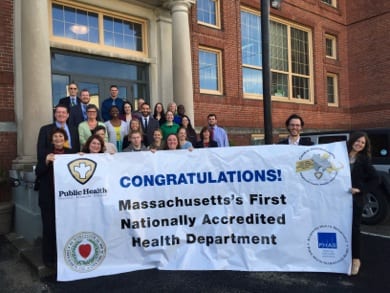Who is a member?
Our members are the local governments of Massachusetts and their elected and appointed leadership.
Mass Innovations, From The Beacon, May 2016
 After the 2008 financial crisis and ensuing recession, the Worcester Division of Public Health found its staff cut by three-quarters, leaving just four employees.
After the 2008 financial crisis and ensuing recession, the Worcester Division of Public Health found its staff cut by three-quarters, leaving just four employees.
Today, it’s one of only 117 nationally accredited public health departments in the United States — and the first in Massachusetts.
On March 17, City Manager Edward Augustus announced that the department earned a five-year accreditation from the Public Health Accreditation Board, which means the department meets or exceeds standards and measures for public health departments set by the national board.
“It’s a pretty rarified group of folks that have accomplished this,” Augustus said. “It sends the signal to anybody who is thinking about working or living in the city of Worcester about what kind of professional public health department we have.”
Augustus said the accreditation could also help the department when it applies for grants and outside funding.
“The moniker of accreditation lets potential funders know this is a department with the most up-to-date and best practices around public health policies and procedures,” he said.
The drive for accreditation began in 2009 under former City Manager Michael O’Brien. Following staff cuts, O’Brien created a Public Health Task Force that worked on creating a roadmap to rebuild the Division of Public Health, according to Worcester Public Health Director Karyn Clark. The task force recommended applying for accreditation from the Public Health Accreditation Board, which was established in 2007 by the Centers for Disease Control and Prevention and the Robert Wood Johnson Foundation.
But before the department could submit an application, it needed to complete three major requirements: a community health assessment, a community health improvement plan, and a strategic plan.
Worcester completed the first two pieces in 2012, with more than 100 individuals, stakeholders and partners taking part in a process that developed almost 90 strategies focusing on five priority areas of health, Clark said. With those identified, the department then built out its strategic plan, which included ways to measure its performance in implementing the strategies.
At the same time, the department was implementing another recommendation of the Public Health Task Force: regionalization. The department piloted a regional collaboration with Shrewsbury in 2010. Since that time, five additional communities have joined the Central Massachusetts Regional Public Health Alliance.
In December 2013, the Worcester Division of Public Health submitted its initial accreditation application and began the intensive process of poring through thousands of documents to find two examples to support each of the nearly 100 measures required as part of the process. The final application was submitted in February 2015, and in the fall, the Public Health Accreditation Board sent a team of five public health professionals to Worcester for a two-day site visit.
“The team was very interested in our regional structure and extremely impressed by the depth and breadth of our community partners, many of whom were invited to a special meeting with the [Public Health Accreditation Board] site visit team to answer questions about the division and the quality of services we deliver to the city of Worcester and the surrounding communities,” Clark said.
Clark said the accreditation process has created a “culture shift” in the city’s Division of Public Health and ultimately changed the way it operates.
“We are more accountable than we were before and we take what we have learned and have implemented continuous quality improvement,” she said. “The staff are committed to excellence. … This was definitely an all-hands-on-deck project, and it paid off.”
Augustus said accreditation ties into the city’s broader public health goal of being the “healthiest city” by 2020. He said the community health improvement plan engaged stakeholders to create the city’s goals and ways to measure progress towards those goals.
“That includes everything from reducing childhood obesity to asthma rates to senior falls,” he said. “It encompasses everybody in the city.”
With accreditation, he said, the city has “cutting edge policies and procedures in place for the goals we want to the engage community on.”
For more information, contact Karyn Clark, director of the Worcester Division of Public Health and the Central Massachusetts Regional Public Health Alliance, at (508) 799-1762 or clarkke@worcesterma.gov.